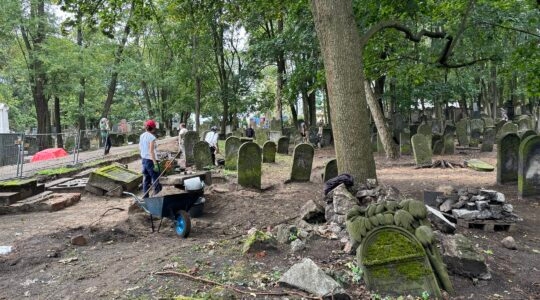(JTA) — Romania’s parliament established a national day celebrating the Yiddish language and theater.
The day, which was declared last week following a unanimous vote, sets aside May 30 as the National Day of the Yiddish Language and Theater in Romania, whose Jewish State Theater is one of Europe’s leading institutions of its kind.
According to the provisions of the new law, each year authorities may organize and take part in cultural, educational, artistic or scientific programs and events dedicated to the promotion of the Yiddish language and theater.
“Yiddish is a living tradition that has transformed over centuries into an exceptional culture for the Jewish people around the world and is an essential part of the identity of Jews in Romania,” Silviu Vexler, a lawmaker in the Parliament of Romania who is Jewish, wrote in a statement about the law he initiated.
His office had worked on the law with Maia Morgenstern, the director of the State Jewish Theater.
That institution in Bucharest is “one of the most beautiful and visible symbols of the Jewish communities in Romania and a true reason of international pride for our country,” Vexler said in an address after the law’s passage.
“This Law, unique around the world, is a symbolic gesture to further recognize the contribution of Jews to the development of Romania and our national culture, but also underlines the unbreakable link between Yiddish and the State Jewish Theatre in Bucharest,” he also said.
Before World War II, Romania had a Jewish population of over 700,000. Between 280,000 and 380,000 Jews were murdered or died during the Holocaust in Romania and in the territories under its control, according to the Final Report of the International Commission on the Holocaust in Romania, which was published in 2004.
May 30th is the date on which, in 1901, Itzik Manger was born. Manger was a prominent Yiddish poet and playwright, who is considered the most prominent Yiddish author in Romania.
The State Jewish Theater marked its 141th anniversary since it was created in the city of Iasi. In 2018, it will celebrate 70 years as a State institution.
Following decades of neglect, in 2014 the theater’s roof caved in, forcing the cast and 20 other employees to cease activity at the theater amid uncertainty over its future. For weeks on end in early 2014, the performers put on free shows once or twice a day in the freezing cold, outside the destroyed building.
City government officials had the building renovated last year.
JTA has documented Jewish history in real-time for over a century. Keep our journalism strong by joining us in supporting independent, award-winning reporting.





